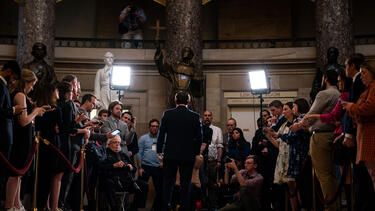Speaker Mike Johnson’s ‘Profiles in Courage’ Moment
Earlier this week, Republican House Speaker Mike Johnson reversed course and helped pass a package of aid to Ukraine, Israel, and Taiwan. Yale SOM leadership expert Jeffrey Sonnenfeld and co-author Steven Tian write that Johnson displayed rare courage in learning on the job and defying extremists in his own party—and draw historical parallels to an ideological conversion that changed the course of the Cold War.

House Speaker Mike Johnson speaking at a news conference earlier this month.
This commentary originally appeared in Newsweek.
This weekend’s political leadership case study felt like a Frank Capra film script of a chapter from John F. Kennedy’s Profiles in Courage, as House Speaker Mike Johnson reversed course and stared down threats from extremists in his party, such as Marjorie Taylor Greene, Matt Gaetz, and Paul Gosar, in passing $95 billion in military support for Ukraine, Israel, and Taiwan. It’s not often that Fox News, CNN, and the New York Times all see things the same way when it come to Washington, D.C., political events, yet Johnson somehow won the acclaim of all these outlets.
Defying those fellow GOP legislators echoing former President Donald Trump’s American First isolationism, which he also once shared, Speaker Johnson announced, “History judges us for what we do,” at the Capitol last week. “This is a critical time right now. I could make a selfish decision and do something that’s different. But I’m doing here what I believe to be the right thing. I think providing lethal aid to Ukraine right now is critically important.” This accidental leader house speaker gave political pundits whiplash in his eagerness to advance the $95 billion foreign aid bill through the House on Saturday, showing a historic ideological trajectory for the conservative Louisiana Republican.
Johnson explained his conversion after meeting with intelligence leaders, military experts, and fellow top congressional leaders. “I really do believe the intel,” Johnson said. “I think that Vladimir Putin would continue to march through Europe if he were allowed. I think he might go to the Baltics next. I think he might have a showdown with Poland or one of our NATO allies.” With a son at the Naval Academy, he concluded, “I would rather send bullets to Ukraine than American boys.”
Johnson pulled off perhaps the rarest political act of courage of all: He grew on the job and admitted what he didn’t know before. If anything, his past gave him additional credibility among his peers, just as when virulent anticommunist fighter Richard Nixon used his past to forge a working relationship with communist China. There is another congressional GOP precedent which rings true.
Speaker Johnson was universally acclaimed across such major outlets as having migrated from the isolationism of the U.K.’s naïve pre-World War II Prime Minister Neville Chamberlain in his appeasement efforts to Winston Churchill’s strong call for unified intervention to block the spread of such evil. While we share that enthusiasm, it is possible that there is an even better political leadership parallel from that era. Neither Chamberlain nor Churchill migrated from the polar opposite positions as Speaker Johnson boldly did. However, former GOP Senator Arthur Vandenberg, the leading voice of congressional isolationism 80 years ago, did have such an epiphany quite like that of Speaker Johnson.
Vandenberg was the leading isolationist voice for a decade leading up to World War II, and a longtime, fervent thorn in the side of President Franklin Roosevelt. But after Senator Vandenberg ascended to the chairmanship of the Senate Foreign Relations Committee post-WWII, he helped lead his many of hardline isolationist colleagues toward an embrace of internationalism, single-handedly whipping up enough GOP votes to pass the Marshall Plan, in addition to the establishment of NATO, preventing Soviet preeminence in the early days of the Cold War.
Vandenberg warned in a pivotal speech on the floor of the Senate in 1945, “We must have maximum allied cooperation and minimum Allied frictions. We have fabulously earned the right to be heard in respect to the basis of this unity. We need the earliest possible clarification of our relations with our brave allies,” winning the support of many of his erstwhile isolationist peers.
Johnson toughened the original Senate legislation on the Ukrainian aid by providing for the Repo Act that monetizes seized Russian assets to help pay for this aid, as endorsed by a wide array of economists and legal experts ranging from Laurence Tribe of Harvard to Roger Myerson of the University of Chicago.
It is also noteworthy that despite threats from certain hardliners to vacate the chair and depose Speaker Johnson, he had the solid support of such key GOP leaders as Mike Turner of the House Intel Committee, and House Foreign Affairs Committee Chair Mike McCaul. As chair McCaul remarked, “All of a sudden, he’s realizing that the world depends on this. This is not some little political game on the floor.” At the same time, such Democratic leaders as Minority Leader Hakeem Jefferies, former Speaker Nancy Pelosi, congressman Daniel Goldman, and even progressive congressman Ro Khanna saluted Johnson as well, providing bulletproof protection from threats to his removal within his own party.
As Ralph Waldo Emerson warned, “A foolish consistency is the hobgoblin of little minds.” There is nothing wrong with changing your mind. Speaker Johnson realized that we need to not succumb to former President Trump’s divide and conquer recipe for political gamesmanship and a pathological career-long fear of partnership through collective action. As isolationist Vandenberg said, we must unify around “the most courageous thinking of which we are capable.” We confront such a time now.
The leadership lessons here are that governing works when patriotic interest prevails over partisan emotions, and when the truth is anchored in facts of shared national interest and not the immediate gain of office seekers.